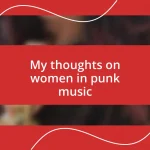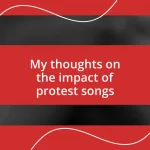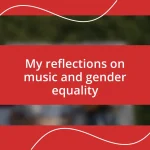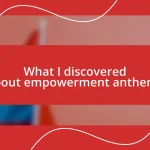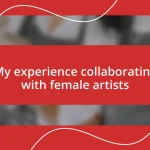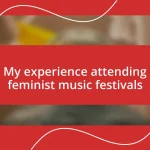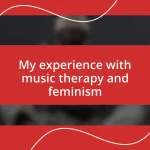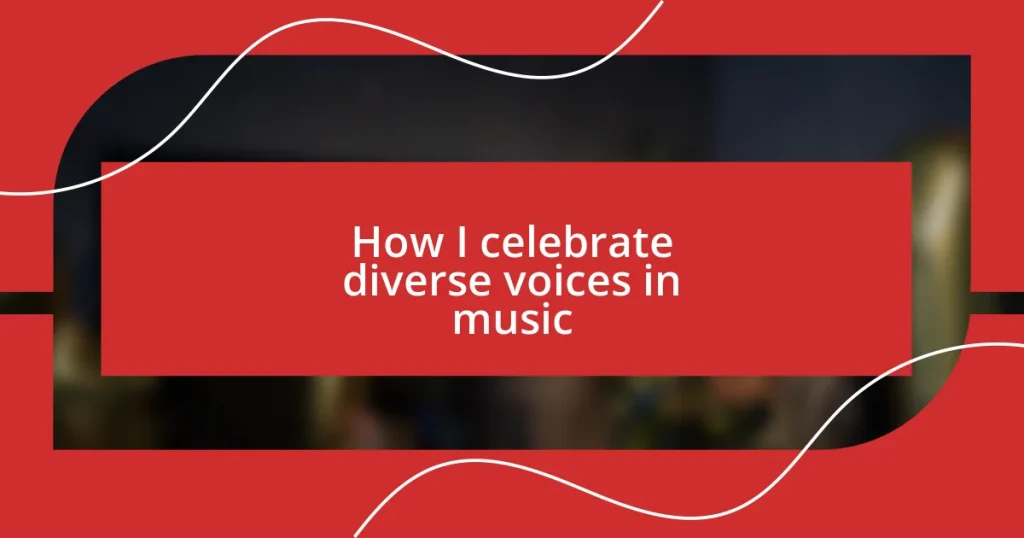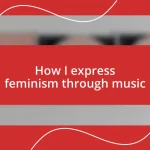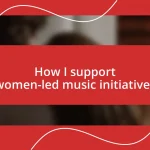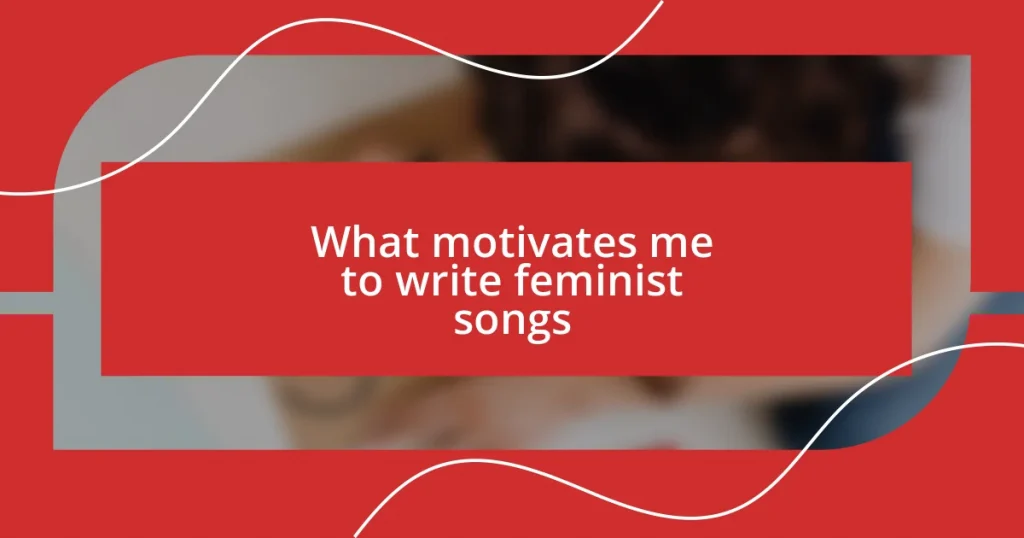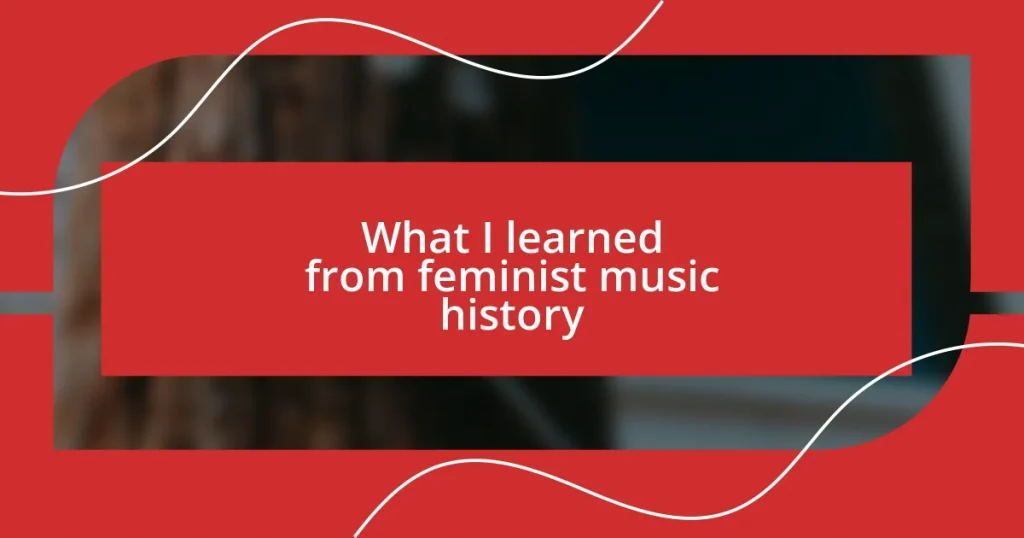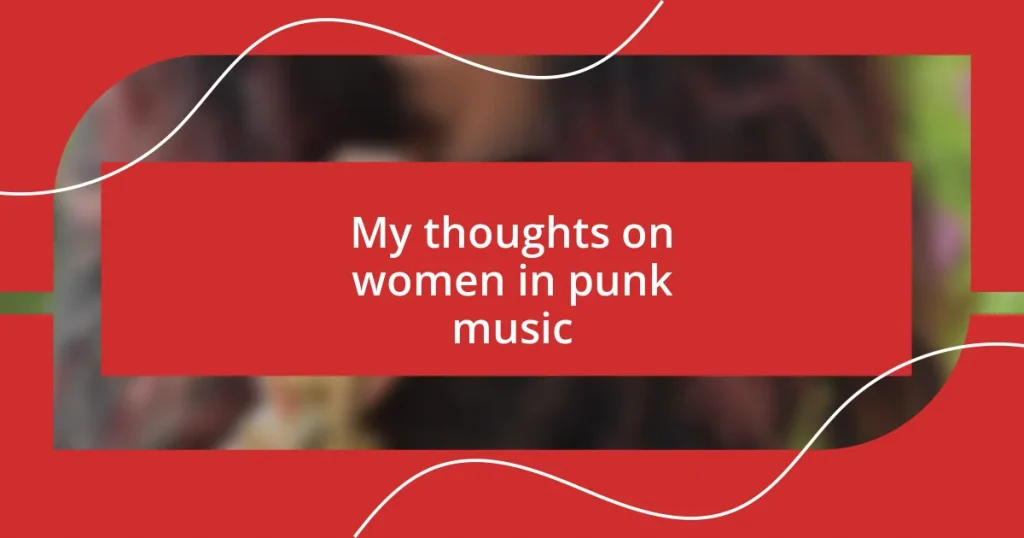Key takeaways:
- The exploration of diverse musical genres deepens emotional connections and enhances understanding of different cultural narratives.
- Collaboration with diverse artists fosters creativity, inclusivity, and the sharing of authentic stories, enriching the music landscape.
- Supporting cultural music festivals and promoting local diverse musicians encourages appreciation of varied cultural expressions and strengthens community ties.
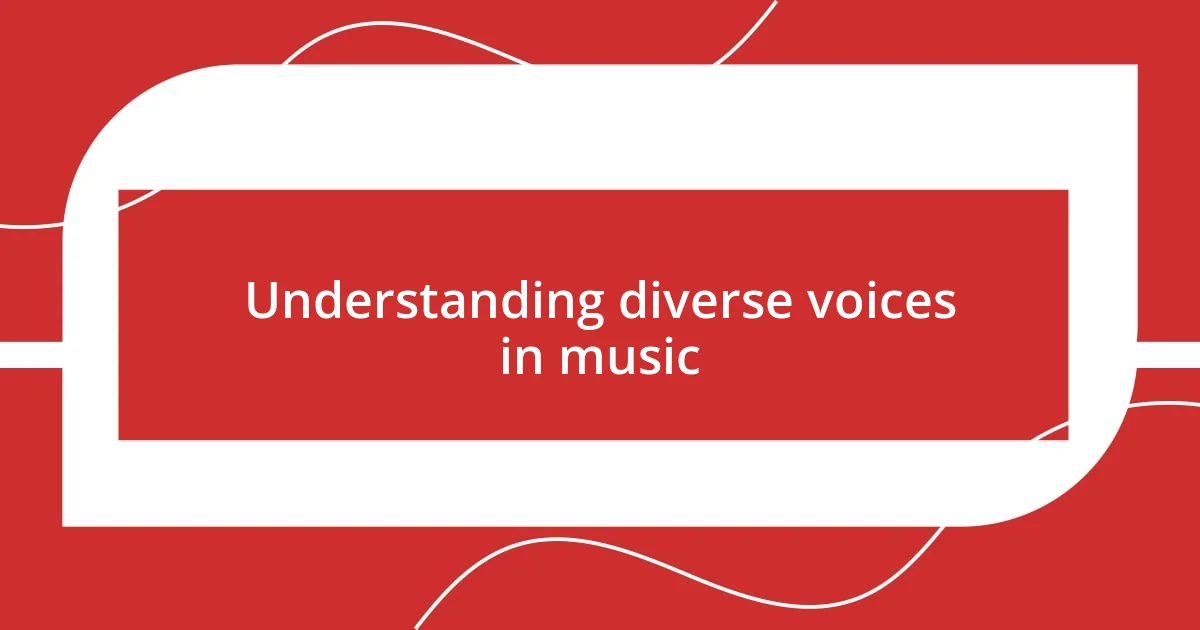
Understanding diverse voices in music
When I listen to music from various cultures, I often find myself reflecting on how unique backgrounds shape artistic expression. Think about it: how can a song from South Africa or a hip-hop track from the Bronx evoke emotions based on the storyteller’s lived experiences? It’s this rich tapestry of narratives that illuminates the essence of diverse voices in music.
I’ve had moments where a foreign melody moved me to tears, even when I couldn’t understand the lyrics. This experience made me realize that emotions in music transcend language barriers. It’s fascinating how certain rhythms or instrumentals can resonate with our feelings, creating a universal connection that speaks to our shared humanity.
I remember attending a cultural festival where different musical genres intertwined. Each performance told a story that was both foreign and familiar. Isn’t it incredible how music can serve as a bridge, allowing us to walk in someone else’s shoes and experience their reality, even if just for a moment? These moments highlight the importance of embracing diverse voices, as they teach us empathy and encourage broader perspectives.
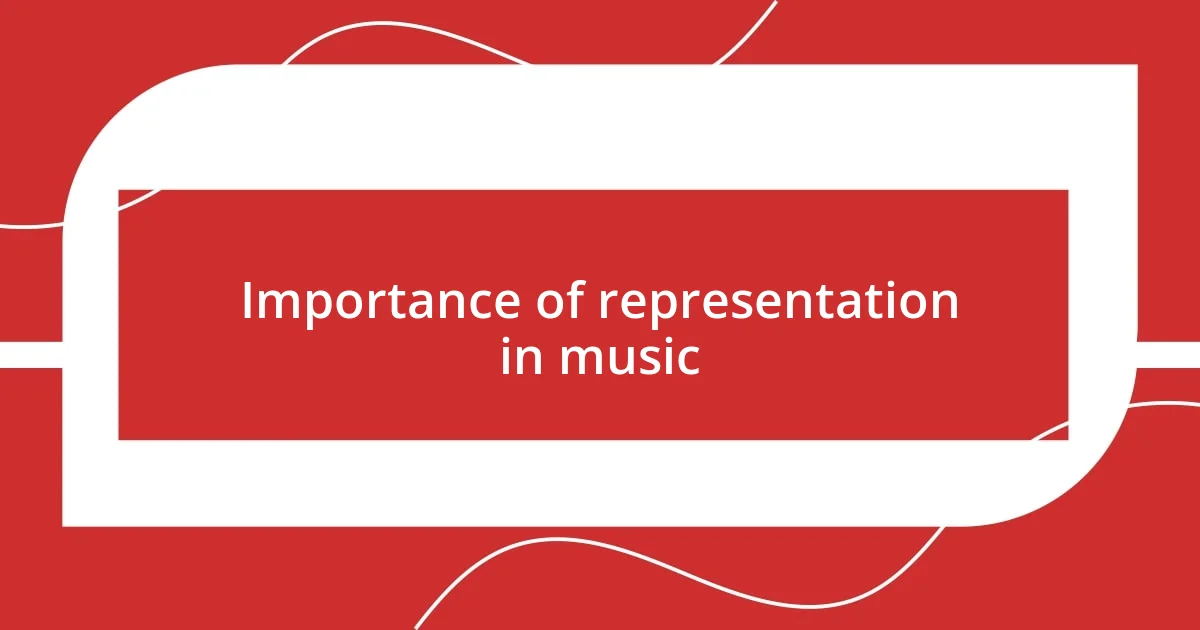
Importance of representation in music
Representation in music is crucial because it allows different cultures and perspectives to be heard and recognized. From my experience, hearing artists who share their authentic stories can be incredibly empowering. When I first listened to a powerful anthem by a female rapper from a marginalized community, it felt like an awakening. Her voice resonated with struggles I hadn’t personally faced but could empathize with deeply.
- Diverse representation fosters creativity and innovation in music.
- It offers listeners new perspectives, fostering empathy and understanding.
- Representation inspires aspiring artists from underrepresented groups.
- Authentic stories in music can serve as catalysts for social change.
Feeling a connection to artists from different backgrounds helps us appreciate the depth of human experience. I vividly recall a local concert where a band fused traditional Indigenous sounds with contemporary genres. It was mesmerizing to see how they maintained their cultural identity while inviting the audience to celebrate it with them. Moments like this are essential, as they showcase the power of representation and create a more inclusive music landscape.
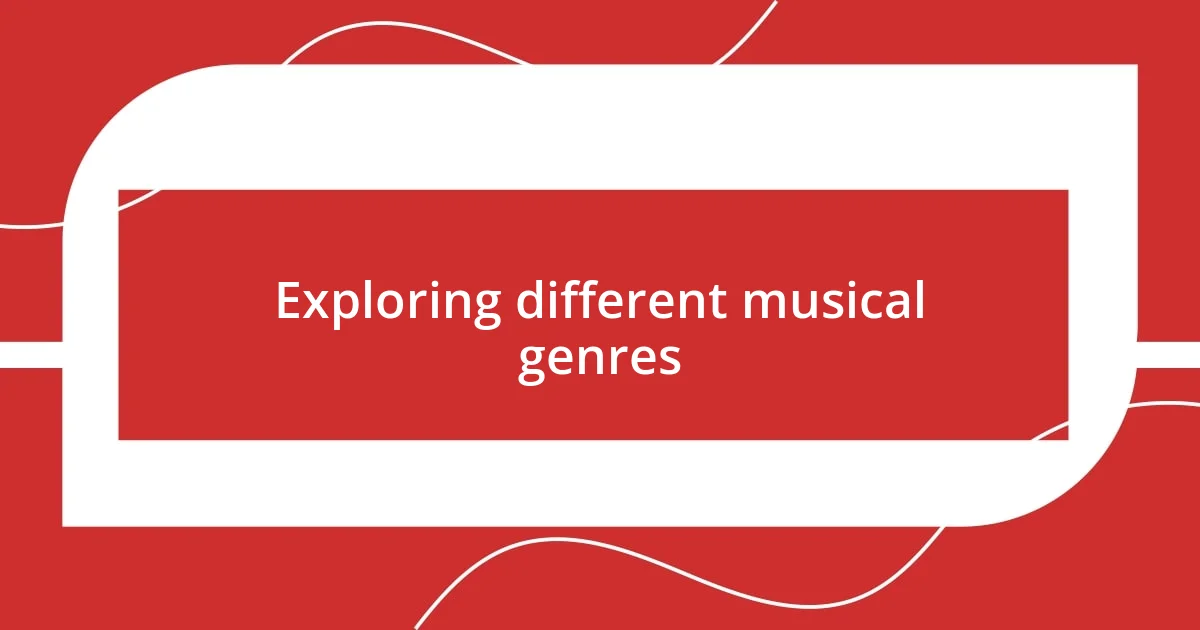
Exploring different musical genres
Exploring various musical genres truly opens up a world of emotion and connection. I remember the first time I stumbled upon reggae music. As the smooth rhythms filled the air, I felt instantly transported to a sunny beach, even though I was sitting in my living room. That genre, rooted in Jamaican culture, was more than music; it was a reflection of social issues, love, and the spirit of resistance. Discovering such genres allows me to appreciate how cultural heritage deeply influences sound and storytelling.
On another occasion, I attended a bluegrass festival that blew me away. I found myself captivated by the banjo’s twang and the heartfelt lyrics that told stories of hard work and love lost. The performers, true to their Appalachian roots, offered a glimpse into a life so different from mine. I often think about how that experience enriched my understanding of American history and the folk narratives intertwined with music. Each genre reveals something vital about cultural identity, offering a unique lens through which to view the world.
Recently, I explored Afrobeat, a genre that mixes traditional African music with jazz and funk elements. The infectious energy of the rhythms made it impossible not to move. Listening to an artist like Fela Kuti, I found layers of political commentary woven into vibrant soundscapes. This genre not only showcased musical diversity but also challenged me to think critically about the social issues it addressed. Engaging with different genres like this transforms the way I perceive music—it becomes a dialogue rather than just sound.
| Genre | Origin |
|---|---|
| Reggae | Jamaica |
| Bluegrass | United States |
| Afrobeat | Nigeria |
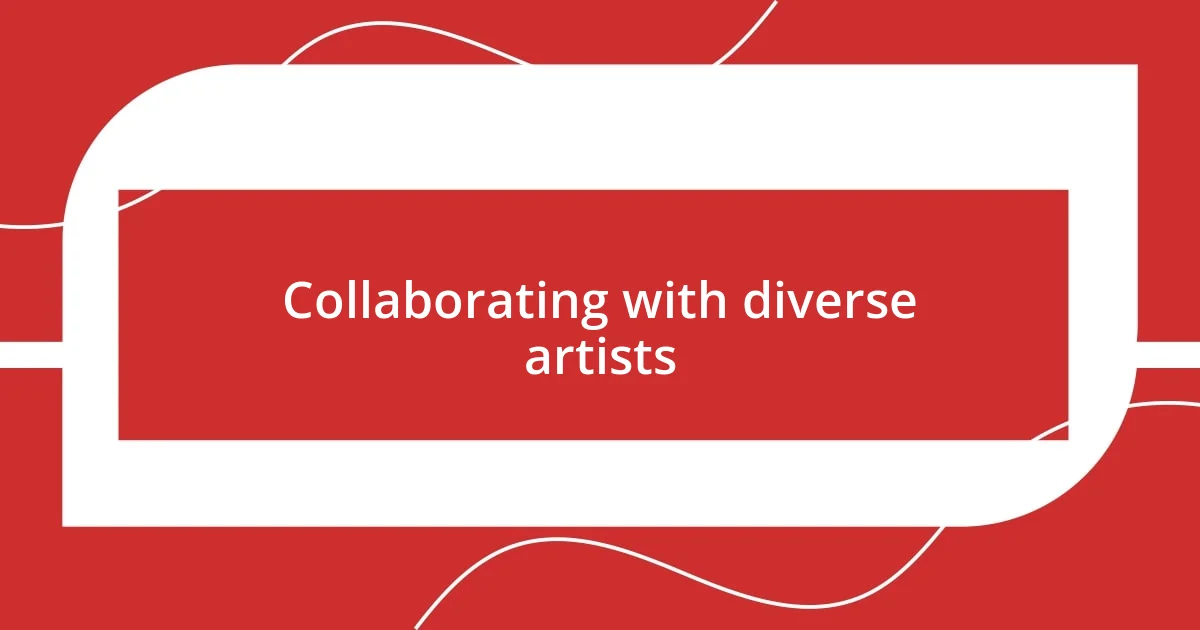
Collaborating with diverse artists
Collaborating with diverse artists is one of the most rewarding experiences in music for me. I recall a time when I had the opportunity to work with a talented musician from a different cultural background who introduced me to their traditional instruments. As we blended our styles, I felt a creative spark; it was as if each note we played told a story that spanned generations. This collaboration made me realize how vital it is to embrace different musical influences to create something truly unique.
One of the most impactful collaborations I’ve been involved in was with a LGBTQ+ artist who shared their personal journey through music. Their vulnerability gave rise to songs that radiated authenticity and raw emotion. I often wonder how many aspiring musicians are out there, waiting for the chance to share their voice. This experience reinforced my belief that the music industry should strive to create more inclusive spaces where diverse talents can shine.
I also remember attending a workshop aimed at fostering collaborations between artists from varied backgrounds. It struck me how everyone brought distinct perspectives and inspirations, resulting in a beautiful tapestry of sound. Isn’t it fascinating how music can unite people? The connections formed during that workshop not only inspired creativity but also built friendships that transcended boundaries, proving that diverse collaborations can lead to extraordinary music that resonates with a global audience.
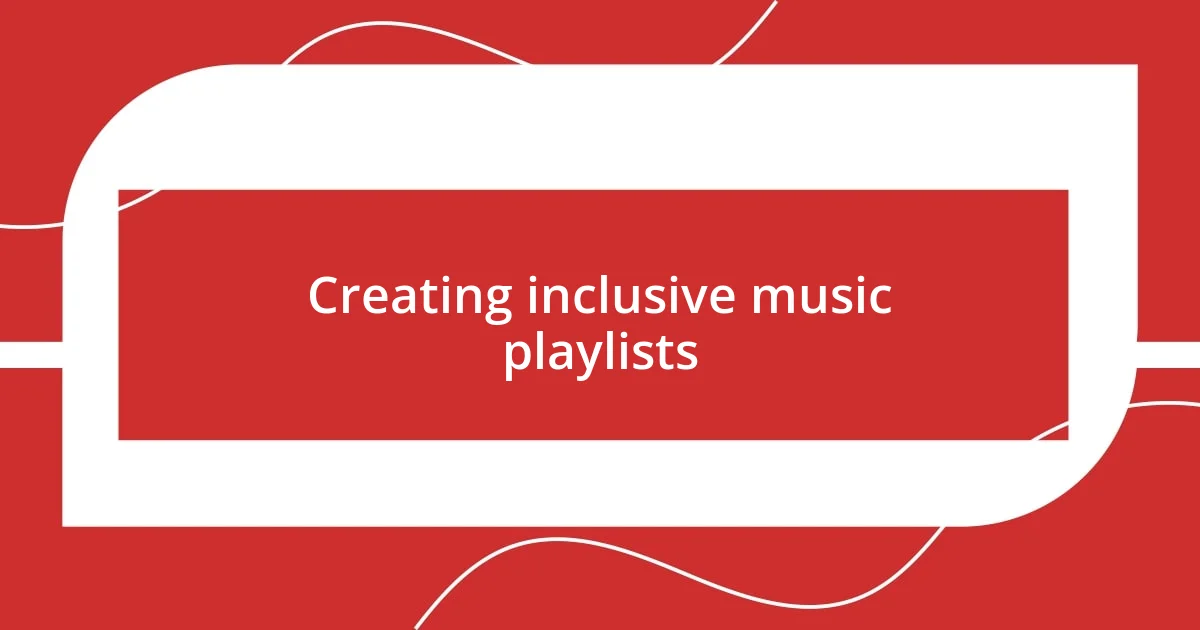
Creating inclusive music playlists
Creating inclusive music playlists is a powerful way to celebrate diverse voices. One evening, I decided to curate a playlist for a gathering, and I made it a point to include artists from various backgrounds. It was amazing to see how the music sparked conversation among friends about their cultural origins and the stories behind the songs. Isn’t it incredible how a single playlist can become a bridge connecting people from different walks of life?
In another instance, I remember blending genres and styles that I’d never thought would work together. I paired a traditional Native American flute piece with contemporary R&B, and the result was unexpectedly harmonious. This experience reminded me that music has no boundaries, and when we open our ears and minds, we can discover new dimensions we never knew existed. Have you ever stumbled upon a surprising musical combination that just clicked?
I also find it essential to highlight lesser-known artists in my playlists. Including emerging voices from underrepresented communities has not only broadened my musical horizons but also supported artists who deserve to be heard. I recently added a female hip-hop artist to my collection whose lyrics powerfully address social justice. Her unique perspective resonates with listeners and encourages us all to engage with the deeper issues in our society. The joy of discovering and sharing such talent truly fuels my passion for music.
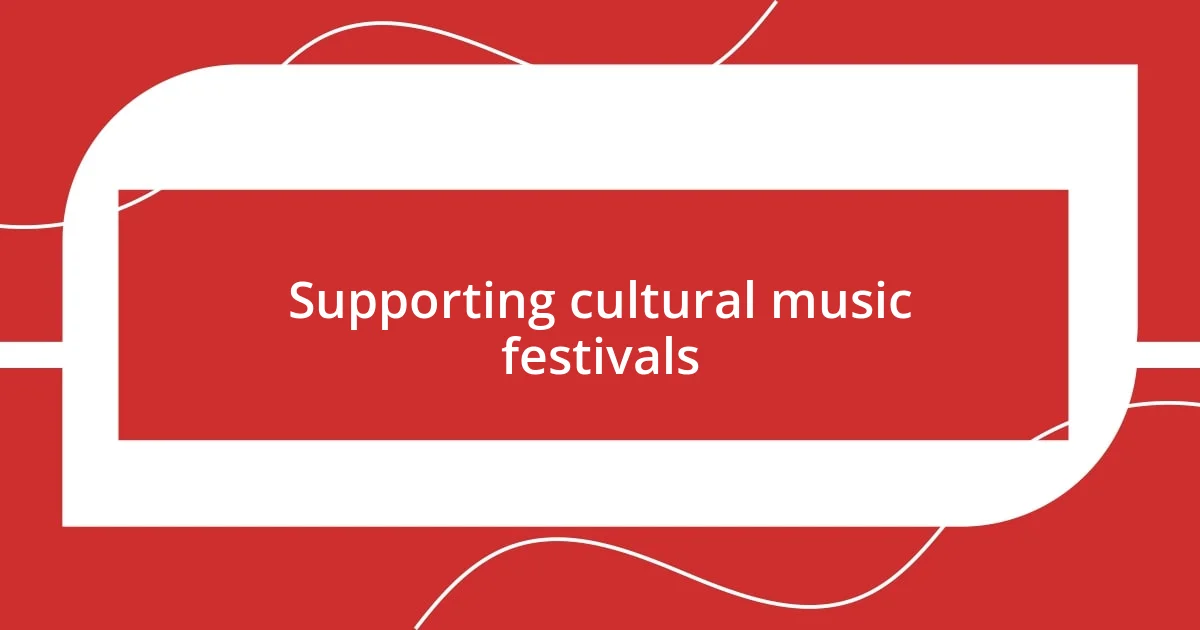
Supporting cultural music festivals
Supporting cultural music festivals is a wonderful way to immerse myself in the rich tapestry of global soundscapes. I remember attending a local festival that celebrated African music, where the energy was contagious. Watching dancers move in vibrant costumes while musicians played traditional rhythms truly transported me; the entire atmosphere felt alive with culture. Isn’t it remarkable how just a few hours at such a festival can spark a deep appreciation for diverse musical traditions?
Another unforgettable experience was when I volunteered at a multicultural festival in my city. I had the privilege of helping set up stages for various acts, each showcasing their unique heritage. I couldn’t help but feel a sense of pride as I watched artists from different backgrounds come together, sharing their stories through music. It makes me wonder how many relationships are forged or renewed at such gatherings, creating a sense of community that extends far beyond the event itself.
Additionally, I often find myself captivated by the intimate stories shared between performers and their audiences at these festivals. I recall a moment during a folk music performance when the artist narrated the history behind a particular song. It was so moving that it reminded me of our shared human experiences, even amidst our many differences. Isn’t the beauty of music that it has the power to transcend barriers, allowing us to connect on a deeper level? Supporting these festivals not only enriches my own life but also honors the diverse voices that contribute to the broader musical landscape.
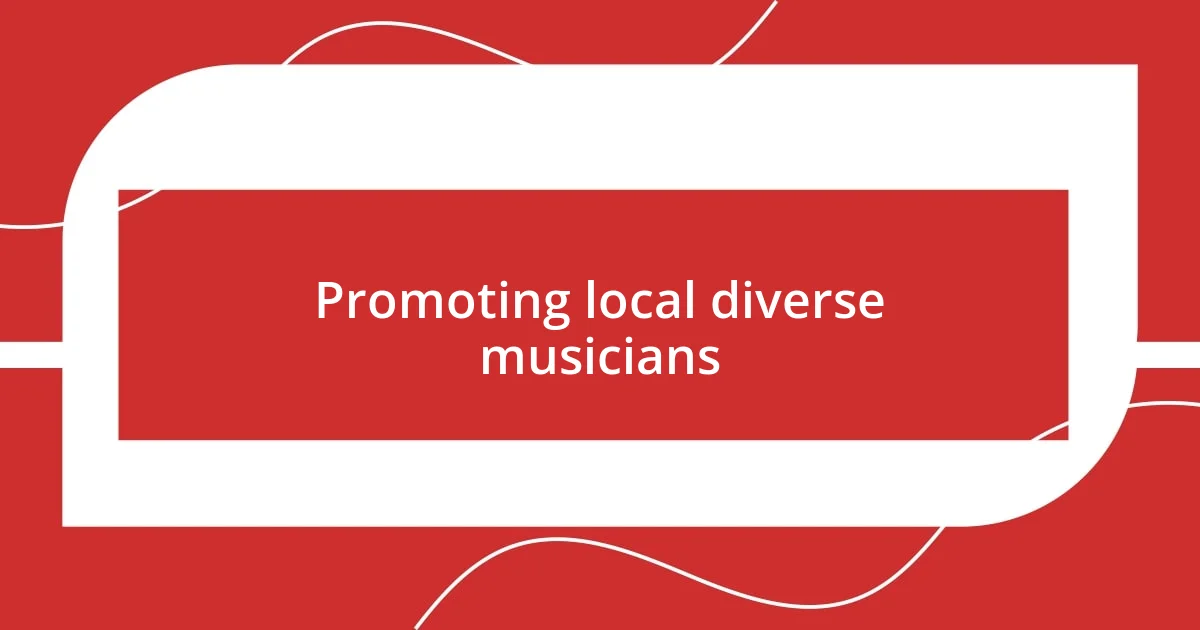
Promoting local diverse musicians
When it comes to promoting local diverse musicians, one approach that resonates with me is collaborating with local venues to showcase their talent. I once attended a small open-mic night at my favorite café, where the stage was filled with artists from different backgrounds, each eager to share their unique sound. It was a powerful reminder of how local spots can serve as platforms for voices that often go unheard, don’t you think?
In another instance, I organized a community jam session that specifically invited musicians from various cultural backgrounds. The blend of sounds—from West African drumming to Latin guitar—created an electrifying atmosphere. Watching the musicians interact and share techniques was inspiring, and I couldn’t help but think about the beauty of music as a universal language that connects us all. Have you ever found yourself swept away by the energy of live music like that?
Additionally, I’ve made it a point to use social media to amplify the messages and music of diverse local artists. I remember sharing a post about a trio of Indigenous musicians whose traditional songs had modern twists—a combination that captivated my followers. The online engagement that followed highlighted the importance of digital platforms in shining a light on emerging talent. It makes me wonder how many hidden gems could be discovered with just a little more visibility.


